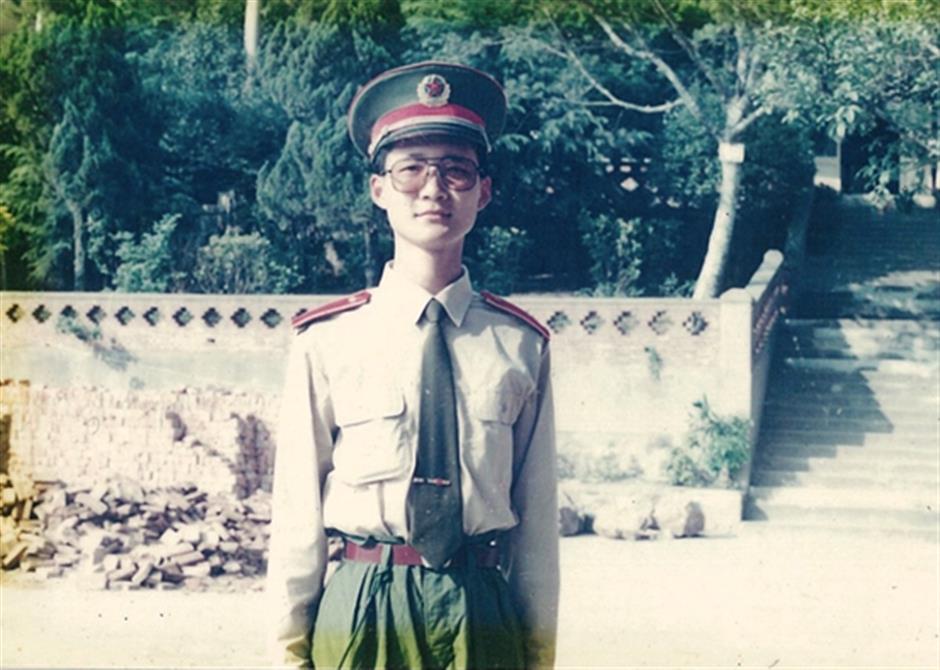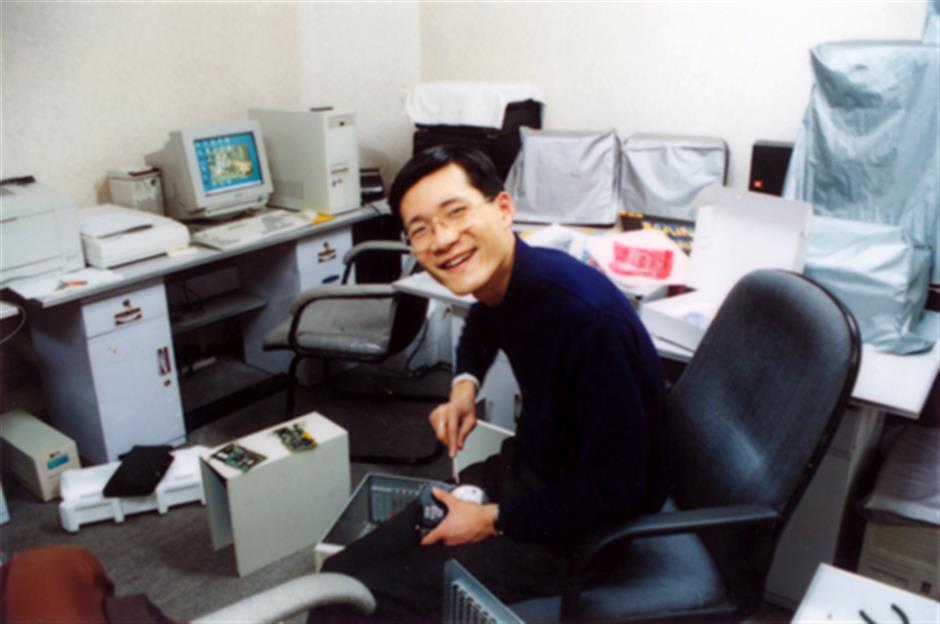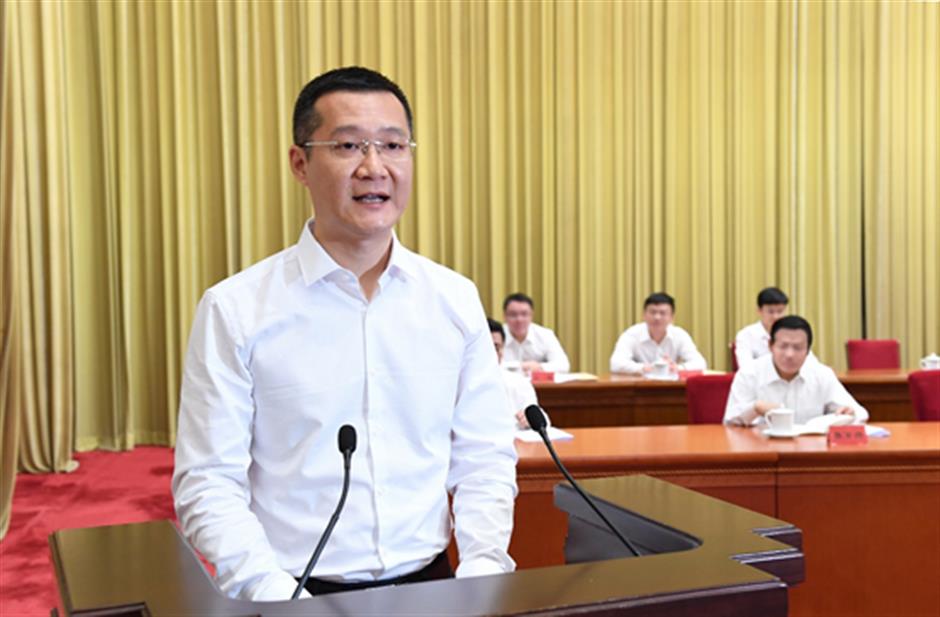
Young Tan Jianfeng studied in the military academy.
Personal profile
Tan Jianfengwas born in Shanghai in January of 1976. He juggles well between the three roles of CPPCC National Committee member,standing committee member of CPPCC Shanghai committee, and chairman of Peoplenet.
He advocates the “Internet + safety” industrial model, and insists on “independent and controllable” innovation and development of core technologies.
Password technologies developed by his team, effectively coordinating the safety and convenience of mobile payment, have filled in a gap for the country and achieved international patents. He also took the lead in formulating state and industry regulations for dynamic password technology.
Since his team developed dynamic password technology and products with full proprietary intellectual property rights in 2007, they have promoted the development of a domestic dynamic password industry, broke the grip overseas products had on the home market and witnessed the country’s independent, innovative development of Internet information security.
My story
I was born into a military family, and have dreamed of defending our country since childhood. During the 1980s when the tide of reform and opening-up swept China, Shanghai was changing a great deal every year. Influenced by my father’s work, I began my association with the computer in grade four.
At that time the computer was considered a luxury and we could not afford one, so I had to go to Teenagers’ Science and Technology Station. Gradually I developed a strong interest.
China began to access the Internet in 1994. Network speed was slow then, only able to satisfy people’s needs to browse BBS and chat. Most people in Internet bars played LAN games such as “Red Alert."
The establishment of my own business originated from playing computer games. Together with two friends I made online, we set up the first generation Internet Security Base in 1997, the first nongovernmental technical platform for computer security in China.
In 2005, I spent the whole year playing World of Warcraft, the hottest online game then, and unexpectedly our team ranked first in the world. However, the account information of a good few team members got stolen while playing the game and equipment worth thousands of yuan vanished immediately. U-type shields were widely used for password protection then in China, while dynamic passwords were generally accepted abroad because they are more convenient and safe.
I began considering how we could prevent account passwords from being stolen. I contacted five partners I met playing online games and stepped into the entrepreneurial journey that is passwords.
Lacking knowledge of relative norms and data, we had to develop from scratch. We worked round the clock, looking up information, programming and fixing bugs. We took a nap in the corner when we felt sleepy, and then we would continue our work. Finally we launched our security chip and products for dynamic password technology after almost one year’s research.

Chinese security chips were invented in Tan's small office.
Being the kernel of information security, password technology, nuclear technology and space technology constitute the three supporting technologies for national security.
Thus its entry threshold is strict. Dynamic password technology then was a blank canvas in China, and it had to go through a series of security evaluations and tests to enter the market.There were 297 technology tests, not to mention all the others. We attained a license after four years, a period of time when we had no revenue at all. For some time I even had to borrow money every week.
Many times I almost gave up, but my team energized me. When I could not pay them for 4 months, none of them left and they continued to encourage me.
In 2011, our iKEY dynamic password technology for authentication, regarded by the Chinese Academy of Sciences as “filling in the domestic gap and reaching advanced world standards,” received a license from the State Cryptography Administration and other departments. For me, security is always the basis. Network security is key to national security. If we depend on overseas technology, it means our lifeline is controlled by others. We must pursue self-dependent innovation.
However, new problems were standing in the way. It was hard for the new technology and products to develop markets, especially the financial market. Our major target customers are the government and the financial industry. In 2011 we received our first order from a well-known securities company of Pudong, Shanghai. Now we have more than 300 million customers and 60 percent market share in the field of dynamic passwords domestically.
We also took the lead in formulating state standards and industry regulations for dynamic passwords. The state standard was the first internationally recognized technology standard for authentication in China. The self-developed cryptosystem-SOTP was invented in December 2015, which once again filled a gap and achieved many international intellectual propriety rights.
The past 10 years have seen the growth of our company and great changes in national network security. Network security is not just the responsibility of the government, but the business of enterprises and the public. A leadership group of national network security was formed in 2014.
As a veteran in the field of information security, I have strived for core domestic password technology for more than 10 years. Without the support of the Party and the government, I could never have made it.

Tan Jianfenggiving a report to the party and the state leader in the Great Hall of the People
On May 27, 2017, as one of six entrepreneur representatives, I gave a report titled “Grasp Core Technology of Information Security with the Hands of Chinese” to the state leaders and young entrepreneur representatives in the Great Hall of the People.
The recent ZTE event reminds us that we are in passive status in many core technologies. Moreover we need more talent to fill the large gap in our national network security, which makes me even more determined in my pursuit.
Shanghai has achieved great progress over forty years of reform and opening-up. I hope that with the expansion of opening-up advocated by the central government, Shanghai will introduce better policies, allowing the public to share more reform dividends and live a life of happiness.
